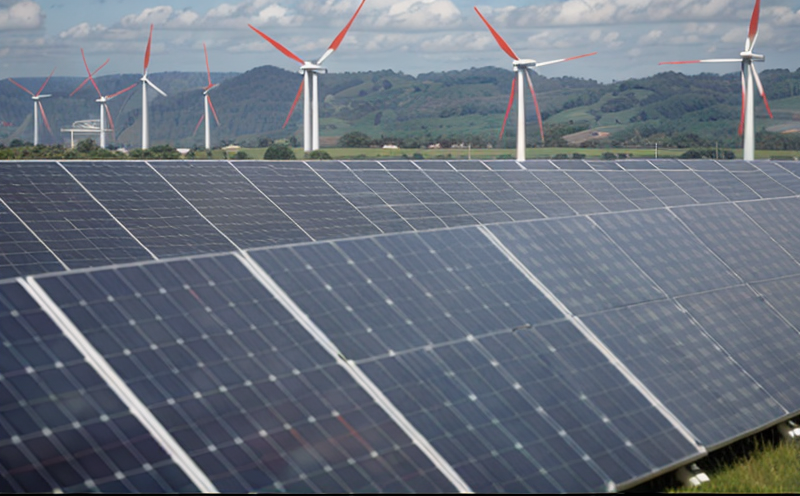Torrefied Biomass Properties Testing
The torrefaction process involves heating biomass in a low-oxygen environment to temperatures between 200°C and 300°C, resulting in the production of torrefied biomass. This process enhances the energy density of biomass by removing moisture and volatiles, making it more suitable for energy applications such as pellets or briquettes. Understanding the properties of torrefied biomass is crucial for optimizing its performance in renewable energy systems.
Our laboratory specializes in providing comprehensive testing services for various physical, mechanical, chemical, and thermal properties of torrefied biomass. These tests are vital for assessing the suitability of torrefied biomass as a sustainable fuel source or raw material. By understanding these properties, stakeholders can make informed decisions regarding its integration into renewable energy systems.
Physical properties include density, particle size distribution, and ash content, which influence the ease of handling and combustion efficiency. Mechanical properties such as compressive strength and modulus are critical for determining the robustness of torrefied biomass in various applications. Chemical analysis helps identify changes in elemental composition due to the torrefaction process, providing insights into its energy density and potential for biofuel production.
Thermal properties like calorific value (CV), combustion temperature, and thermal stability are essential for optimizing the performance of torrefied biomass in heating systems or gasification processes. The CV is a key indicator of the fuel's energy content, while combustion temperature and thermal stability ensure efficient and clean burning without excessive emissions.
Our testing services utilize state-of-the-art equipment tailored to accurately measure these properties. Specimen preparation involves precise sampling techniques followed by careful drying and conditioning to remove moisture before analysis. This ensures that the test results are representative of actual conditions in real-world applications.
The significance of torrefied biomass lies in its role as a bridge between conventional fossil fuels and more sustainable bioenergy sources. By enhancing energy density, reducing combustion emissions, and improving handling characteristics, torrefied biomass offers a viable option for meeting growing global demand for renewable energy solutions.
Our laboratory adheres to international standards such as ISO 17225:2018 and ASTM D6459-22 to ensure accurate and reliable test results. These standards provide clear guidelines on specimen preparation, testing methods, and acceptance criteria, ensuring that our findings are consistent with industry best practices.
Why It Matters
The torrefied biomass properties testing service is essential for the development and optimization of renewable energy systems. Accurate property data enables stakeholders to make informed decisions regarding the suitability of torrefied biomass as a sustainable fuel source or raw material.
For quality managers, this information helps ensure that products meet specific performance requirements and specifications. Compliance officers can use these test results to verify adherence to relevant regulations and standards. R&D engineers rely on our testing services to refine processes for improving the efficiency of torrefied biomass in various applications.
In the context of renewable energy systems, understanding the properties of torrefied biomass is crucial for optimizing its performance. By enhancing energy density, reducing combustion emissions, and improving handling characteristics, torrefied biomass offers a viable option for meeting growing global demand for renewable energy solutions.
The testing service also supports procurement activities by providing reliable data on supplier performance. This ensures that the highest quality materials are selected for integration into renewable energy systems, contributing to overall product reliability and sustainability.
Applied Standards
In our laboratory, we adhere to international standards such as ISO 17225:2018 and ASTM D6459-22 for torrefied biomass properties testing. These standards provide clear guidelines on specimen preparation, testing methods, and acceptance criteria.
ISO 17225:2018 focuses on the determination of mechanical properties of wood materials, including torrefied biomass. It specifies procedures for testing compressive strength and modulus using standard specimens prepared according to ISO standards. This ensures that our findings are consistent with industry best practices.
ASTM D6459-22 covers the determination of calorific value (CV) in wood materials, including torrefied biomass. The standard outlines methods for measuring CV by bomb calorimetry or higher heating value (HHV) determinations using standard procedures. Our laboratory employs these methods to provide accurate and reliable test results.
These standards ensure that our testing services meet the highest quality and reliability benchmarks, providing stakeholders with confidence in the accuracy of our findings.
Quality and Reliability Assurance
We are committed to delivering high-quality, reliable test results for torrefied biomass properties. Our laboratory employs a rigorous quality management system that adheres to international standards such as ISO 9001:2015.
This system ensures that all aspects of our testing process—from specimen preparation to data analysis—are conducted with precision and accuracy. We invest in state-of-the-art equipment and continuously train our staff to stay updated on the latest technological advancements and best practices.
Our commitment to quality is further demonstrated through independent audits and certifications, ensuring compliance with industry standards. By maintaining these high standards, we provide stakeholders with confidence that their testing needs are met reliably and accurately.





